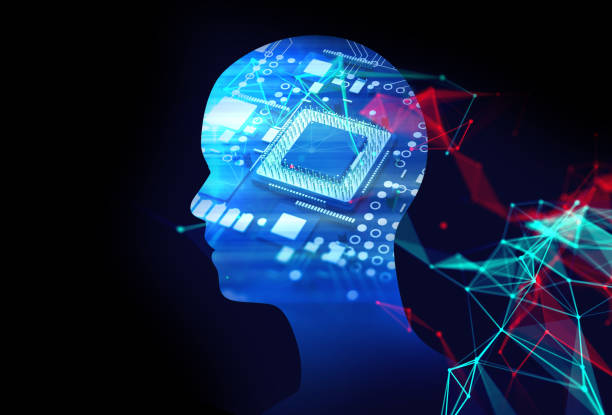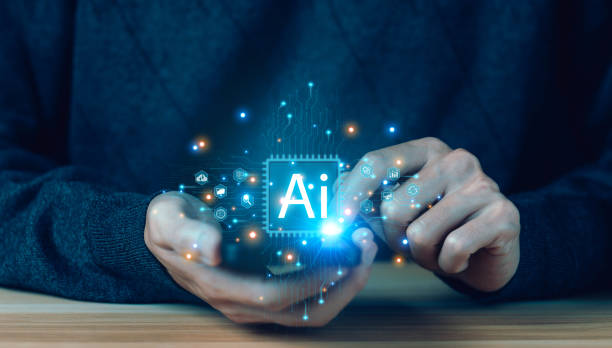What is Artificial Intelligence and How Does it Work?
#Artificial_Intelligence (Artificial Intelligence or AI) is a branch of computer science that deals with building machines that are capable of performing tasks that usually require human intelligence.
These tasks include learning, problem-solving, pattern recognition, natural language understanding, and decision-making.
In short, the goal of #Artificial_Intelligence is to create systems that can think and act like humans.
Wikipedia provides useful definitions and information in this area.
Artificial intelligence uses various algorithms and models to process data and perform tasks.
Some of the most important techniques used in artificial intelligence are:
- Machine Learning: Allows machines to learn from data without being explicitly programmed.
- Neural Networks: Models that are inspired by the structure of the human brain and are used for pattern recognition and deep learning.
- Natural Language Processing: Enables machines to understand and generate human language.
- Computer Vision: Enables machines to see and interpret images.
Artificial intelligence is currently used in many fields, including:
- Healthcare: Diagnosing diseases, developing drugs, and caring for patients.
- Finance: Detecting fraud, managing risk, and providing financial advice.
- Transportation: Self-driving cars, traffic management, and route optimization.
- Marketing: Personalizing advertisements, analyzing customer behavior, and predicting sales.
The development of artificial intelligence also comes with challenges, including:
- Ethical issues: Responsible use of artificial intelligence and prevention of discrimination.
- Security: Protecting artificial intelligence systems against cyber attacks.
- Transparency: Understanding how artificial intelligence systems make decisions.
Did you know that poor online store design can drive away up to 70% of your potential customers? Rasaweb transforms your sales by designing professional and user-friendly online store websites.
✅ Significant increase in sales and revenue
✅ Full optimization for search engines and mobile
⚡ [Get a free consultation from Rasaweb]
Types of Artificial Intelligence Approaches and Applications
Artificial intelligence can be divided into different categories based on its capabilities and approaches.
In terms of capabilities, artificial intelligence can be divided into two main categories:
- Narrow or Weak AI: This type of artificial intelligence is designed to perform a specific task and cannot function outside of that task.
Most artificial intelligence systems used today fall into this category.
For example, a facial recognition system or a voice assistant like Siri. - General or Strong AI: This type of artificial intelligence has cognitive abilities similar to humans and can perform any task that a human is capable of doing.
Strong artificial intelligence is still in the theoretical stage and does not exist in practice.
Click here to preview your posts with PRO themes ››
In terms of approaches, artificial intelligence can be divided into the following categories:
- Machine Learning: As mentioned earlier, this approach allows machines to learn from data.
Machine learning itself is divided into different categories, including supervised learning, unsupervised learning, and reinforcement learning. - Expert Systems: These systems store specialized knowledge in a specific field and use it to solve problems.
- Robotics: This field deals with the design and construction of robots that can perform physical tasks.
Many robots use artificial intelligence to control movements and make decisions.
The applications of artificial intelligence are very broad and can be used in almost any industry.
Some of the important applications of artificial intelligence are:
- Self-driving cars: Self-driving cars use artificial intelligence to understand their surroundings and drive without the need for a driver.
- Facial recognition: Artificial intelligence is used to recognize people’s faces in images and videos.
- Language translation: Artificial intelligence is used to translate text and speech from one language to another.
- Recommender Systems: Artificial intelligence is used to recommend products, movies, music, and other content to users.
Machine Learning The Backbone of Artificial Intelligence
Machine learning is one of the most important sub-branches of artificial intelligence and allows machines to learn from data without explicit programming.
In other words, machines use machine learning algorithms to identify patterns and relationships in data and use these patterns for prediction or decision-making.
There are different types of machine learning algorithms, each suitable for a specific type of problem.
Some of the most important types of machine learning are:
- Supervised Learning: In this type of learning, the machine is given a set of data along with the corresponding labels.
Using this data, the machine learns a model that can predict the labels of new data.
Examples of supervised learning include classification and regression. - Unsupervised Learning: In this type of learning, the machine is only given a set of data and there are no labels.
The machine must identify the patterns and structures in the data on its own.
Examples of unsupervised learning include clustering and dimensionality reduction. - Reinforcement Learning: In this type of learning, an agent is placed in an environment and receives rewards or penalties for performing various actions.
The agent tries to find a policy that maximizes the reward by learning through trial and error.
Reinforcement learning is used in robotics and computer games.
Click here to preview your posts with PRO themes ››
Machine learning plays a very important role in the development of artificial intelligence.
Many artificial intelligence systems, including facial recognition systems, language translation systems, and recommender systems, use machine learning algorithms.
Without machine learning, the development of advanced artificial intelligence would not be possible.
| Learning Type | Description | Example |
|---|---|---|
| Supervised Learning | Learning from labeled data | Spam email detection |
| Unsupervised Learning | Learning from unlabeled data | Customer clustering |
| Reinforcement Learning | Learning through trial and error | Playing games |
Deep Neural Networks The Beating Heart of Modern Artificial Intelligence
Neural Networks are computational models inspired by the structure of the human brain.
These networks consist of a large number of nodes (neurons) that are connected in different layers.
Each node applies an activation function to its input and sends the output to the nodes in the next layer.
TensorFlow is a popular framework for building and training neural networks.
Deep Neural Networks (DNNs) are neural networks with a large number of layers.
These networks are capable of learning complex patterns from data and have performed very well in many fields.
Deep neural networks are used in various fields, including:
- Computer Vision: Object detection, facial recognition, and image generation.
- Natural Language Processing: Language translation, text generation, and sentiment analysis.
- Speech Recognition: Converting speech to text.
- Computer Games: Playing games at the human level or even beyond.
Training deep neural networks requires a large amount of data and high computing power.
For this reason, the development of deep neural networks has been made possible by hardware and software advances in recent years.
One of the challenges of deep neural networks is their lack of transparency.
It is difficult to understand how these networks make decisions, which can create ethical and legal issues.
Researchers are trying to develop methods that can make deep neural networks more transparent and understandable.
Is your online sales not as good as you expect? With Rasaweb, solve the problem of low sales and poor user experience forever!
✅ Significant increase in visitor-to-customer conversion rate
✅ Creating a pleasant user experience and increasing customer trust
⚡ Act now to get a free consultation!
Natural Language Processing The Key to Human-Machine Interaction
Natural Language Processing (NLP) is a branch of artificial intelligence that allows machines to understand and generate human language.
NLP includes a wide range of tasks, including:
- Text Analysis: Extracting information from text, such as identifying names, places, and organizations.
- Language Translation: Translating text and speech from one language to another.
- Text Generation: Generating text automatically, such as writing article summaries or answering questions.
- Sentiment Analysis: Detecting the author’s feelings from the text.
- Language Understanding: Understanding the meaning of sentences and texts.
NLP is used in many fields, including:
- Voice Assistants: Like Siri and Alexa.
- Search Engines: Like Google.
- Chatbots: To provide customer service.
- Social Media Analysis: To understand people’s opinions on various topics.
The development of NLP comes with challenges, including:
- Ambiguity of language: A word or sentence can have different meanings.
- Variability of language: Human language is very diverse and has different dialects and styles.
- Contextual knowledge: Understanding language requires contextual knowledge.
Researchers are trying to develop NLP models that can overcome these challenges.
One of the important approaches in this area is the use of deep neural networks.
The Future of Artificial Intelligence Opportunities and Challenges
Artificial intelligence is advancing rapidly and is expected to play a very important role in our lives in the future.
There are many opportunities to use artificial intelligence in various fields, but there are also challenges that need to be addressed.
Some of the opportunities of artificial intelligence are:
- Increased Productivity: Artificial intelligence can perform tasks that humans do faster and more efficiently.
- New Job Creation: Artificial intelligence can create new jobs that did not exist before.
- Improved Quality of Life: Artificial intelligence can help improve our quality of life in various areas, such as healthcare, education, and transportation.
Some of the challenges of artificial intelligence are:
- Ethical Concerns: Responsible use of artificial intelligence and prevention of discrimination.
- Job Displacement: Artificial intelligence can cause job loss in some industries.
- Security: Protecting artificial intelligence systems against cyber attacks.
- Control: Ensuring that artificial intelligence is under human control.
In order to make the most of the opportunities of artificial intelligence and manage its challenges, we need appropriate policies and public education.
We must ensure that artificial intelligence is used for the benefit of all members of society and contributes to sustainable development.
Applications of Artificial Intelligence in Daily Life
Artificial intelligence is no longer an abstract concept, but is present in many aspects of our daily lives.
From smartphones to transportation systems, #Artificial_Intelligence helps improve our efficiency and convenience.
Below are some common applications of artificial intelligence in daily life:
- Voice Assistants: Siri, Alexa, and Google Assistant are examples of #Artificial_Intelligence-based voice assistants that allow us to control our devices, search for information, and perform various tasks using our voice.
- Recommenders: Recommender systems in online stores, movie and music streaming platforms, and social networks use #Artificial_Intelligence to suggest products, movies, music, and other content to users.
- Facial Recognition: Facial recognition technology is used in smartphones, security systems, and various applications.
- Language Translation: #Artificial_Intelligence-based language translation services allow us to easily communicate with other people who speak different languages.
- Self-Driving Cars: Although self-driving cars are still in the early stages of development, they have a lot of potential to change the way we travel.
These cars use #Artificial_Intelligence to understand their surroundings and drive without the need for a driver.
With the ever-increasing advancement of #Artificial_Intelligence, it is expected that its applications in our daily lives will increase.
This technology can help us have a more comfortable, efficient, and enjoyable life.
| Application | Description | Example |
|---|---|---|
| Voice Assistants | Controlling devices with voice | Siri, Alexa |
| Recommenders | Suggesting products | Amazon, Netflix |
| Facial Recognition | Identifying people | Smartphones |
| Language Translation | Translating text and speech | Google Translate |
Artificial Intelligence in Healthcare A Revolution in Medical Care
Artificial intelligence has the potential to transform the healthcare industry.
From diagnosing diseases to developing drugs, artificial intelligence can help doctors and researchers work more efficiently and accurately.
This means earlier diagnosis of diseases, more effective treatments, and ultimately, improved patient health.
Below are some applications of artificial intelligence in healthcare:
- Diagnosing Diseases: #Artificial_Intelligence algorithms can analyze medical images such as radiology and MRI and detect abnormalities that may be hidden from the human eye.
This helps in the early diagnosis of diseases. - Drug Development: #Artificial_Intelligence can speed up the drug development process and reduce its costs.
#Artificial_Intelligence algorithms can identify potential drug molecules and predict their effectiveness and safety. - Personalizing Treatment: #Artificial_Intelligence can help doctors personalize treatments based on the individual characteristics of each patient.
This means more effective treatments and fewer side effects. - Surgical Robotics: Surgical robots equipped with #Artificial_Intelligence can perform surgeries with greater precision.
This helps reduce risks and improve surgical outcomes. - Hospital Management: #Artificial_Intelligence can help hospital management allocate their resources optimally and increase efficiency.
With the ever-increasing advancement of #Artificial_Intelligence, it is expected that its role in healthcare will increase.
This technology can help improve the health and well-being of people around the world.
Are you tired of your online store having visitors but no sales? Rasaweb solves your main problem by designing professional online store websites!
✅ Significant increase in sales with targeted design
✅ Flawless user experience for your customers
⚡ Get a free consultation!
Artificial Intelligence and the Future of Work Will Robots Replace Humans?
One of the important questions about #Artificial_Intelligence is whether robots and #Artificial_Intelligence systems will replace humans in the labor market? This question has raised many concerns about job loss and economic inequality.
In reality, the impact of #Artificial_Intelligence on the labor market is more complex than simply replacing jobs.
While #Artificial_Intelligence can automate some repetitive and routine tasks and eliminate some jobs, it can also create new jobs and increase the efficiency of humans.
In general, jobs that require complex cognitive skills, creativity, problem-solving, and social interactions are less at risk of being replaced by #Artificial_Intelligence.
In contrast, jobs that involve repetitive and routine tasks are more at risk of automation.
In order to benefit from the advantages of #Artificial_Intelligence in the labor market and prevent its negative effects, we need to retrain the workforce and invest in new skills.
We also need to adopt policies that prevent economic inequality and support people who lose their jobs.
Ultimately, the future of work with #Artificial_Intelligence depends on how we manage this technology.
If we can use #Artificial_Intelligence responsibly and with the goal of improving human lives, we can benefit from its advantages and manage its challenges.
How to Learn Artificial Intelligence Learning Resources and Paths
If you are interested in learning #Artificial_Intelligence, there are many learning resources and paths available to you.
From free online courses to advanced university programs, you can choose the appropriate learning path based on your level of knowledge and goals.
Below are some learning resources and paths for #Artificial_Intelligence:
- Online Courses: Platforms like Coursera, edX, and Udemy offer many online courses in the field of #Artificial_Intelligence.
These courses are suitable for different levels of knowledge and can help you learn the basic and advanced concepts of #Artificial_Intelligence. - Books: There are many books on #Artificial_Intelligence that you can use to learn the basic and advanced concepts of this field.
- Articles and Blogs: Many articles and blogs are published on #Artificial_Intelligence that you can use to stay up to date with the latest developments and trends in this field.
- University Programs: If you want to gain a deeper knowledge of #Artificial_Intelligence, you can participate in relevant university programs.
- Online Communities: There are many online communities about #Artificial_Intelligence that you can join and connect with other people who are interested in this field.
To start learning #Artificial_Intelligence, it is best to first learn the basic concepts such as machine learning, neural networks, and natural language processing.
Then, you can go to more advanced topics based on your interests.
Practice and practical experience are also very important for learning #Artificial_Intelligence.
Try to do practical projects and use #Artificial_Intelligence tools and frameworks such as Python, TensorFlow, and PyTorch.
Frequently Asked Questions
| Question | Answer |
|---|---|
| 1. What is Artificial Intelligence (AI)? | It is a branch of computer science that aims to create machines capable of simulating human intelligence and performing tasks that require human thinking, such as learning, problem-solving, and decision-making. |
| 2. What are the main types of artificial intelligence? | It can be classified into weak artificial intelligence (Narrow AI) that focuses on a specific task, general artificial intelligence (General AI) that possesses comprehensive human capabilities, and super artificial intelligence (Super AI) that surpasses human intelligence. |
| 3. Mention some common applications of artificial intelligence in our daily lives. | These include voice assistants (such as Siri and Alexa), recommendation systems (such as Netflix and Amazon), self-driving cars, facial recognition systems, and spam filters. |
| 4. What is the difference between artificial intelligence and machine learning? | Artificial intelligence is the broader concept of creating intelligent machines, while machine learning is a subset of artificial intelligence that focuses on enabling systems to learn from data without explicit programming. |
| 5. What is Deep Learning? | It is a subset of machine learning that uses multi-layer artificial neural networks (deep neural networks) to process data and discover complex patterns, and is used in image and speech recognition. |
| 6. What are the most prominent benefits of artificial intelligence? | Improving efficiency and productivity, automating repetitive tasks, making better decisions based on big data analysis, and developing solutions to complex problems in fields such as medicine and science. |
| 7. What are the main challenges facing the development and deployment of artificial intelligence? | These include the need for huge amounts of high-quality data, privacy and security issues, bias in data and algorithms, and high development and maintenance costs. |
| 8. Does artificial intelligence raise ethical or social concerns? | Yes, it raises concerns about privacy, algorithmic bias, job loss due to automation, responsibility for errors committed by intelligent systems, and the need for a regulatory framework. |
| 9. How can artificial intelligence affect the future of the labor market? | It can lead to the automation of some routine jobs, but it will also create new jobs that require advanced skills in developing, operating, and maintaining artificial intelligence systems. |
| 10. What are some modern or promising technologies in the field of artificial intelligence? | These include advanced Natural Language Processing (NLP) (such as large language models like ChatGPT), Computer Vision, Robotics, and Generative AI. |
And other services of Rasa Web Advertising Agency in the field of advertising
Intelligent advertising campaign: a combination of creativity and technology to attract customers through intelligent data analysis.
Intelligent sales automation: an effective tool to increase click-through rate with the help of real data.
Intelligent UI/UX: designed for businesses that seek to analyze customer behavior by optimizing key pages.
Intelligent Google Ads: a combination of creativity and technology to increase click-through rate by dedicated programming.
Intelligent Customer Journey Map: A fast and efficient solution for digital branding with a focus on Google Ads management.
And more than a hundred other services in the field of internet advertising, advertising consulting, and organizational solutions
Internet Advertising | Advertising Strategy | Advertorial
Resources
Let’s Know the Basics of Artificial Intelligence
,What is Artificial Intelligence (AI)?
,Artificial Intelligence (AI) – IBM
,What is Artificial Intelligence? | Oracle
Are you ready to shine your business in the digital world? “Rasaweb Afarin”, the leading digital marketing agency, with comprehensive services including professional WordPress website design, SEO, and content marketing, is your guide to reaching the peaks of online success.
📍 Tehran, Mirdamad Street, next to Central Bank, South Kazerun Alley, Ramin Alley No. 6













